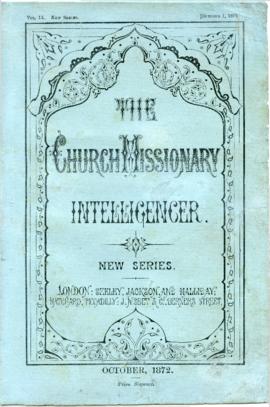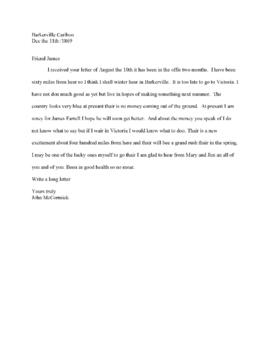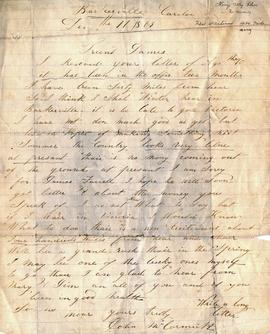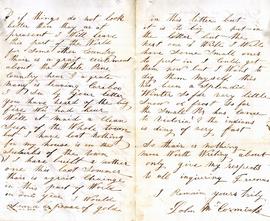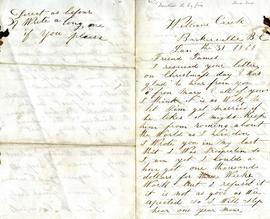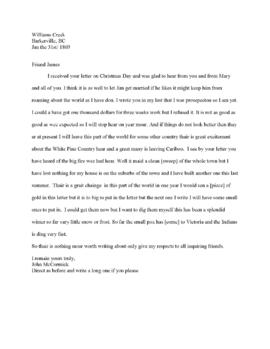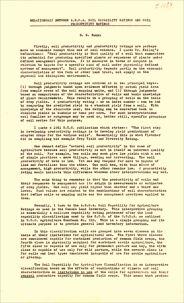File consists of materials resulting from the interview with Krystyna Simpson, conducted as part of the Living Landscapes Red Rock Project. Includes audio cassettes containing the oral history, a transcript of the interview, and a consent form.
File contains obituaries for Collison as well as for his son Henry Alexander (H.A.) and granddaughter Katherine Clarke (nee Collison); various articles re: Collison’s many accomplishments; a letter of condolence from Councillors of the Haida Nation on the occasion of his death, a program from Collison’s memorial service at Metlakatla, and a typed biography.
File contains an article identified as having been written by W.E. Collison on the topic of the development of First Nations peoples along the North Pacific Coast.
A monthly journal published by the Church Missionary Society (CMS) featuring the work of CMS missionaries around the world. Note: pages 315-320 are missing.
File consists of a transcript of an oral history interview with the Groenvelds.
File consists of a transcript of an oral history interview with Barb Harkins. Also includes photocopies of Barb Harkins' personal records, such as photographs.
File consists of a transcript of an oral history interview with Doug Homme. Also includes photocopies of Doug Homme's personal records, such as photographs.
File consists of a transcript of an oral history interview with Jim and Dianne Humphreys.
File consists of a transcript of an oral history interview with Virginia Karr.
File consists of a transcript of an oral history interview with Andre Laquerre.
File consists of a transcript of an oral history interview with Victor Litnosky.
File consists of a transcript of an oral history interview with Jack Long.
File consists of a transcript of an oral history interview with Coralee Madden.
File consists of a transcript of an oral history interview with Anna Mellos.
File consists of a transcript of an oral history interview with Ken and Donna Quinn.
File consists of a transcript of an oral history interview with Joe Rositano.
File consists of a transcript of an oral history interview with Joe Rositano.
File consists of a transcript of an oral history interview with Alice Sanregret.
File consists of a transcript of an oral history interview with Carl Strom.
File consists of a transcript of an oral history interview with Steve and Helen Wlasitz.
This document is a contemporary transcription of a Hudson's Bay Company Fort George (New Caledonia) post journal. The accuracy and completeness of this transcription is not verified.
This document is a contemporary transcription of a Hudson's Bay Company Fort George (New Caledonia) post journal. The accuracy and completeness of this transcription is not verified.
This document is a contemporary transcription of a Hudson's Bay Company Fort George (New Caledonia) post journal. The accuracy and completeness of this transcription is not verified.
This document is an unpublished draft manuscript of a Northern British Columbia history annotated bibliography. The document is based overwhelmingly on research into secondary sources published prior to 2016; more recent sources are not included. The annotated bibliography includes the following sections:
- Historiography
- Settlement Histories
- Alexander Begg's History of British Columbia
- R.E. Gosnell
- E.O.S. Scholefield
- Regional History
- New Histories
- Environment
- Northern History
- Ancient History
- Bibliography
Map depicts location of treasure hidden between Clearwater and Clemina, BC.
Map depicts the Shuswap Lakes, Rogers Pass, Kamloops, Yellowhead Pass, Thompson Valley, and the Nicola Valley. Also includes the first clues to a treasure hunt.
This external hard drive contains back-up files from Gary Runka and Joan Sawicki's computers. The digital files consist of personal, professional, and business records. Includes textual documents (PDF and Word format), spreadsheets (Excel), digital images (JPEG), and email backup files.
File consists of a speech given by Gary Runka entitled "Relationship Between A.R.D.A. Soil Capability Ratings and Soil Productivity Ratings".
Commentary on this speech by Barry Smith of the Ministry of Agriculture and Lands:
"This is a very useful overview of the agricultural capability ratings.
While no mention is of course made in this (circa) 1969 speech to the BC farmland preservation program, its value rests in the importance of the BCLI in the original designation the ALR and its future administration.
For anyone that is or has been involved with the farmland preservation program, this single sentence within the speech, made about 4 or 5 years before the designation of the ALR, provides an important insight into the value of the CLI and its relationship to farmland preservation. "For example. Class 5 soils while restricted in use to pasture or hay can produce very high yields."
File consists of a speech given by Gary Runka to the Canada Soil Survey Committee in Ottawa entitled "Land Capability Analysis".
Commentary on this speech by Barry Smith of the Ministry of Agriculture and Lands:
"This is a fairly technical speech explaining the history, and mechanics of the evolving land capability analysis process in BC. It gives insight into this early period in which there was a fair amount of trial and error to develop the best techniques to display and utilize information.
From an agricultural perspective the speech notes (p.5) that compatibility between agriculture and other sectors is not high. The speech demonstrates what would emerge as an important link between Land Capability Analysis and the ALR. On page 7 "possible predictions that will result in land use conflicts but perhaps better long range planning" are insightful and in the case of this statement, reads like a tentative foreshadowing of the BC farmland preservation program that would emerge in about two years.
"(1) Agriculture - "(c) Conservation of agricultural land through rural zoning of those high capability and high productivity soils, near markets."
It is unknown if the use of the acronym C.S.S.C was intended to refer to the "Canada Soil Survey Committee", which held its eighth meeting in Ottawa in 1970, or to the "Canadian System of Soil Classification. Regardless, for more information on the subject a copy of the 1998 / 187 page report by the Soil Classification Working Group entitled, "The Canadian System of Soil Classification" can be found here: https://sis.agr.gc.ca/cansis/publications/manuals/1998-cssc-ed3/cssc3_manual.pdf "
File consists of a speech given by Gary Runka at UBC entitled "Land Capability Analysis".
File consists of a speech given by Gary Runka to the Agricultural Institute of Canada entitled "Managing Our Land Resources for Survival and Pleasure".
Commentary on this speech by Barry Smith of the Ministry of Agriculture and Lands:
"This speech is aimed at land use planning and planners, and GGR provides his definition of "ecology" which includes:
"...the basic characteristics of the land - its geology, soils, climate, vegetation, and animal life, including the devil that does the most damage, man. It also includes the interrelationships within these basic characteristics and of course this is where the word "complexities" comes in. There are no two places where these components combine in exactly the same manner and each ecological unit, if you like, is unique."
GGR mentions the importance of considering options.
This package includes a copy of the speech as well as a second, 2 page document, with the same title in which GGR is noted as 'Manager of the BC Land Commission'. This second document is largely a summary of the more formal speech."
File consists of a speech given by Gary Runka entitled "Problems and Solutions: The BC Land Commission Experience" at the Conference on Agricultural Land Preservation in Washington State at the University of Washington, Seattle.
Commentary on this speech by Barry Smith of the Ministry of Agriculture and Lands:
"This speech, written for and delivered to an international audience, reads like an article aimed at providing an historical overview of the first three years of the work of the Land Commission.
While succinct, it also has the quality of a comprehensive overview. Up to this point this is the best item in the collection explaining the background of the legislation, implementation and administrative challenges of the Commission over its first three years of operation.
Given when it was written - at a time when the formative history of the Land Commission was being made and by a person in the very centre of this history who was day-by-day helping to create this history - this is a singularly important document."
File consists of a speech given by Gary Runka to the Canadian Council on Rural Development entitled "Land Use Control".
Commentary on this speech by Barry Smith of the Ministry of Agriculture and Lands:
"This is another important document.
GGR covers several points including a discussion of the impact of changes to rural areas from the food producer's perspective. He notes that local governments are not well positioned to effectively achieve farmland preservation - but there is a need for a coordinated approach.
The point is made that good rural planning depends on good urban planning.
A summary is made of efforts at rural planning and farmland preservation in other North American jurisdictions. An example is outlined of the complexity of overlapping land use controls and returns to a common theme - "merging the reality of land as a commodity with the ethic of land as a natural resource"."
File consists of a contribution to a workshop given by Gary Runka entitled "The Use of Bio-Physical Information - BC Land Commission Overview". Includes excerpts from the Proceedings from the Workshop on Ecological Land Classification in Urban Areas, Canadian Committee on Ecological Land Classification, 23 & 24 Nov. 1976, Toronto.
Commentary on this speech by Barry Smith of the Ministry of Agriculture and Lands:
"Besides a copy of the speech, the package includes + a letter from Ed Wiken of the Canada Committee on Ecological (Bio-Physical) Land Classification to G.G. Runka dated October 1977 and a "Notice of Publication" + 1 copy of the published paper entitled "The Use of Biophysical Information - B.C. Land Commission Overview" by G.G. Runka, Chairman, B.C. Land Commission.
This speech was given to a workshop in Toronto and very closely resembles and reads like a draft of the published (polished) 3 page paper.
GGR remarks that:
"As you can appreciate, we often find ourselves in the centre of politically sensitive issues. For this and other reasons, the Commission might be described as being on the "firing line" with regards to the use of bio-physical information - it is the basis of our agricultural zoning and the basis of our everyday decisions regarding applications under the Act and changes to the Agricultural Land Reserve."
The speech and paper provide an important overview on the role of the Canada Land Inventory (CLI) agricultural capability ratings in the designation of the ALR and is especially important because the paper is written by the individual who was central to both the development of the CLI in B.C. and designation of the ALR.
The published paper forms pages 141 to 143 of the 167 page proceedings of the 1976 workshop."
File consists of a speech given by Gary Runka entitled "Agricultural Land Commission 1978 - What's Happening?" to a UBC Soil Science and Land Use Planning Seminar.
Commentary on this speech by Barry Smith of the Ministry of Agriculture and Lands:
"This is simply a single page outline of a speech given at a UBC Soil Science and Land Use Seminar providing an overview of the farmland preservation program to date.
The outline is broken into 5 sections:
- Brief History (of the legislation, designation of the ALR and program administration);
- Fine Tuning (of the ALR);
- Grazing Lands;
- Settlement and Community Plans; and
- The "young farmer" program"
The actual speech based on this outline is not included."
File consists of a speech given by Gary Runka entitled "Urban Growth Impact on Rangelands in British Columbia" for the Society for Range Management - Pacific Northwest Section in Spokane, Washington.
Commentary on this speech by Barry Smith of the Ministry of Agriculture and Lands:
"In this speech GGR focuses on a single example of the Lauder Ranches at Glimpse Lake (north east of Merritt and about 12 km north of Douglas Lake) and states that his perspective for the purpose of his presentation is to look through the eyes of one that perceives the utilization of the forage resource to best advantage is for red meat production as opposed to the view of the urban planner.
In this example it appears the "urban" land use is a proposal to subdivide land along the lake shore for residential / recreation purposes.
GGR outlines the potential impacts on the long standing ranching operation. In his summary he mentions his concern with regard to recent changes to the (now) Agricultural Land Commission Act in stating, "...I think recent amendments to the Agricultural Land Commission Act opening appeal of Commission decisions to the political arm is going to cause serious problems (politicians do not understand the impact question)..." This is a reference to the appeal mechanism to ELUC.
There is also an appeal for beef producers to get involved more directly in planning and political processes which is a theme GGR has expressed in previous speeches."
File consists of a speech given by Gary Runka entitled "Land Use Planning and the Nursery Trades" to the BC Nursery Trades Association.
Commentary on this speech by Barry Smith of the Ministry of Agriculture and Lands:
"The primary thrust of the speech is to outline several pieces of legislation and other land uses that may have an impact on the nursery trade use of land including:
- Federal Fisheries Act;
- Municipal & regional district bylaws and plans;
- Agricultural Land Commission Act;
- Soil Conservation Act;
- Water Act and Floodplain Regulation;
- Forest and Range Acts; and
- Your neighbours changing land-use activities.
GGR comments (p 2) that, "...exclusion (of land from the ALR) is only allowed on lands not capable of agricultural use where no impact would be effected on adjacent farmlands, or where absolutely no alternative for the alternate use proposed exists." This clarifies that land in the ALR, even if it is proven unsuitable for agriculture, may remain in the ALR if its exclusion impacts adjacent farmland. On the other hand, pressure on the ALR is acknowledged where claims can be successfully mounted that no alternative exists for a proposed use, demonstrating the continual vulnerability of the ALR and the need to be able to clearly assess claims of "no alternative".
Foreshadowing the need for agricultural area planning, GGR suggests (p. 3) that it is important that, "... attempts be made to encourage local agricultural use planning so as to reduce conflicts within agriculture and with your urban neighbours."
File consists of a speech given by Gary Runka entitled "Agricultural Land Preservation - Some of the Problems" to an unknown audience, possibly a political caucus. A "Process Chart" of the B.C. Agricultural Land Commission Act is attached to the speech.
Commentary on this speech by Barry Smith of the Ministry of Agriculture and Lands:
"This speech was given several months after GGR's resignation as Chair of the Commission in January, 1979. There is no specific indication of who the speech was given to but mention is made to "caucus members" (p. 4) and therefore may have been the NDP caucus.
Specific mention is made to the opportunity to undermine the program by the Section 9(8) changes to the Act. (This is a reference to allowing the Minister of Agriculture to forward appeals of Commission's decisions to the Environment and Land Use Committee of Cabinet if no two Commissioners give leave to appeal)..
Mention is also made to the need for the Commission to be aware of problems affecting agriculture if it is to be the true defender of agricultural interests. Reference (p. 3) is made to the Commission being: "... too busy attending to applications to take a seriously positive role to ensure that present and future land use conflicts ... are minimized."
GGR also raises his concern with attempts to narrow the definition of "agricultural land" by suggestions that CLI Class 4 - 7 lands be automatically excluded from the ALR. He also expresses the need to be concerned with land use planning outside the ALR.
GGR criticizes "a less than positive attitude by government" (to farmland preservation) and calls for the need for a provincial land use strategy."
File consists of a speech given by Gary Runka entitled "Proposed Hydro Development - Peace River Valley: Some Questions" to the Peace Valley Environmental Association in Dawson Creek. Note that page 3 of the speech appears to be missing.
Commentary on this speech by Barry Smith of the Ministry of Agriculture and Lands:
"The speech discusses some broad questions particularly related to the lack of a provincial energy policy, the approval process and varying estimates of future energy needs and alternatives. GGR quotes the position of the ALC of October 1977 and also reviews the legal powers under the ALC Act and ends by outlining several questions he feels the Association has the right to ask and get answers to."
File consists of a speech given by Gary Runka entitled "Land Resource Issues in BC" at a UBC seminar.
Commentary on this speech by Barry Smith of the Ministry of Agriculture and Lands:
"This speech / paper asks the question, "Are we in fact making any real progress towards resolving .... land resource conflicts...?"
A discussion is introduced that land resource issues are rural planning issues and as such they impact rural people and their lifestyle and thus translate to lifestyle issues. GGR suggests that planners are urban oriented and they should stand on the rural side of the fence and look back at the urban areas rather than the other way around.
Too often in government an agency's interests are paramount and insist that others tag along as long as they don't interfere with the prime use thrust. A concern is also expressed with "...too many waves of single use legislative power coming to the fore..." It is noted that the "...goal of any regulatory program should be to protect important public interests."
The paper concludes by considering a few current land resource issues including:
- Forestry-Agriculture
- Grazing land tenure transfer
- Fisheries - Agriculture - Forestry - Urban
- Energy - Agriculture
- Urban-Rural
- Energy-Lifestyles
- Wildlife - Recreation - Energy
- Agriculture and Recreation Lands - Foreign Ownership and Influence
While farmland preservation isn't central to this speech the rural resource and planning theme is relevant."
